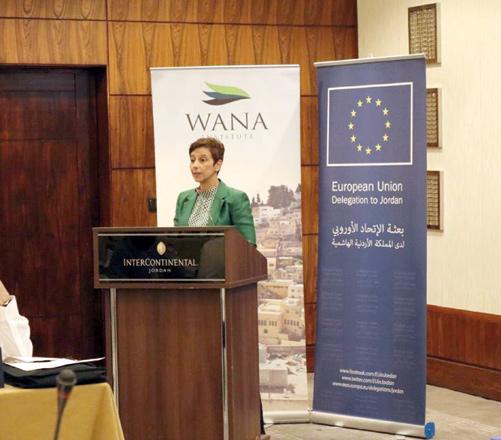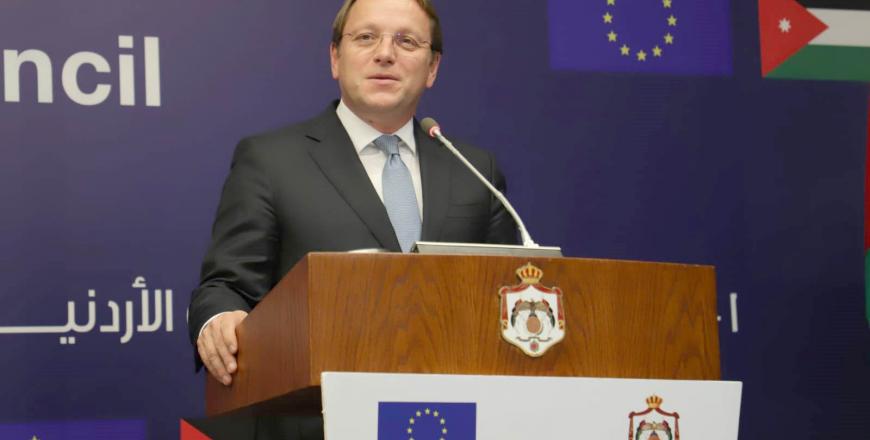You are here
EU urges Jordan to continue pursuit of reform, democratisation
By JT - Mar 30,2014 - Last updated at Mar 30,2014
AMMAN — Acknowledging the severe impact of the Syrian crisis on the Kingdom, the EU has provided more than 225 million euros of humanitarian and development aid to Jordan over the last two years in support of refugees and host communities.
According to the annual European Neighbourhood Package (ENP) 2013 Country Progress Report on Jordan, published late last week by the European Commission, EU-Jordan cooperation continued in 2013 and adapted to current circumstances, mainly the Syrian crisis and its consequences on Jordan
“The country has been severely affected since 2011 by the Syrian crisis which is causing increasing socio-economic challenges,” the report said.
“Jordan has been facing a steady and continuous wave of refugees from Syria [by the end of December more than 584,600 officially registered with the UNCHCR] straining the country’s natural resources [notably water],” it added.
The refugee influx has had an impact on the Kingdom’s economy and continues to exert “tremendous pressure” on its educational system and healthcare services, according to the EU report, a copy of which was sent to The Jordan Times.
The annual ENP report on Jordan underlined key developments and reform efforts in 2013, and offered recommendations for 2014.
In 2013, the report said, Jordan acted upon a number of “key recommendations” in the previous ENP progress report, notably the adoption of an anti-corruption strategy and ratification of the regional convention on pan-Euro-Mediterranean preferential rules of origin.
Other key recommendations made previously remain valid.
Urging the Kingdom to continue pursuing reform and enforce adopted laws, the EU called on Jordan to repeal or amend by October 1 all laws in line with the 2011 constitutional amendments.
Jordan should build “a more consensual, inclusive, participatory and open political system” by amending the “electoral legal framework, and strengthening the independence and impartiality of the judiciary and its administrative capacity”.
The report called on Jordan to take concrete steps to eradicate violence against women and promote further integration of women into politics, economic affairs, education and employment.
The Kingdom should also move forward with the ratification of the Optional Protocol to the Convention Against Torture and Other Cruel, Inhuman or Degrading Treatment or Punishment.
The EU report said Jordan should ensure freedom of expression and freedom of the media by amending the Penal Code to ensure that relevant violations are no longer referred to the State Security Court.
On the condition of press freedoms, the report said around 250 websites were blocked as they did not register and obtain a licence from the Press and Publications Department.
“Arrests related to freedom of expression continued in 2013,” it added.
In other recommendations of an economic and financial nature, the EU advised Jordan to continue implementing the stand-by agreement with the International Monetary Fund, including addressing the issues of tax reform.
The report called for taking “determined action” to improve the business and investment environment through legislative and regulatory measures, with a view to enhancing growth.
“Reforms initiated, carried out successfully, or delayed during 2012 in the different areas of cooperation between the EU and Jordan are described in the annual country report. Some of the issues reported deserve special attention,” the report said.
“Corruption remained a matter of serious concern… No progress can be reported in enhancing the effectiveness and independence of the judiciary.”
In relation to free movement of goods and technical regulations, the report said Jordan continued working towards establishing the adequate institutional and legal basis for negotiating the Agreement on Conformity Assessment and Acceptance of Industrial Products aimed at facilitating the access of Jordanian industrial products to the EU internal market and vice-versa.
“The EU-Jordan Dialogue on Migration, Mobility and Security continued in 2013. Discussions were fruitful and negotiations for a joint declaration establishing a mobility partnership between the EU and Jordan were launched in December,” the ENP report said.
|
EU-Jordan relations The European Neighbourhood Policy (ENP) governs relations between the EU and Jordan 2002: EU-Jordan Association Agreement entered into force 2005: EU-Jordan Action Plan was approved 2008: Launch of the Union for the Mediterranean 2010: Negotiations of the second EU-Jordan ENP Action Plan completed 2010: “Advanced status” partnership agreed in October (EU-Jordan Association Council) 2012: Second EU-Jordan ENP Action Plan formally adopted |
Related Articles
AMMAN — The EU is expected to finalise its European Neighbourhood Policy (ENP) Review on November 18 after consultations with all partners,
AMMAN — The European Union on Monday reaffirmed its commitment to strengthening its strategic relationship with Jordan during a country even
DEAD SEA — European Commissioner for Neighbourhood and Enlargement Oliver Varhelyi on Thursday announced the launch of the EU-Jordan Investm


















